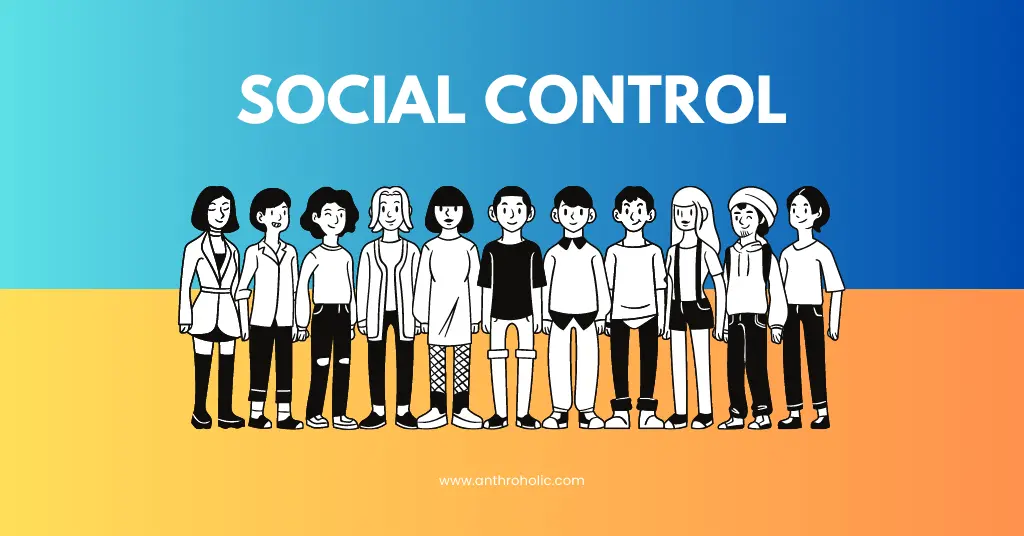AI Answer Evaluation Platform Live Now. Try Free Answer Evaluation Now
Social Control
Social control refers to the various mechanisms that regulate individual and group behavior in an attempt to maintain order and promote conformity within a society. It is established through social norms, rules, laws, and structures that dictate how individuals should behave in their society.

Types of Social Control
There are two main types of social control:
- Direct: This involves control through explicit rules, laws, and regulations. The state, institutions, and other authorities often execute it.
- Indirect: This involves control through social norms and values that are implicitly taught and learned through socialization processes.
Formal and Informal Social Control
Formal Social Control
Formal social control is executed by authorized agents such as police officers, judges, school administrators, and employers. It includes established laws, rules, and regulations in society. Examples include:
- Penal systems
- Workplace regulations
- School rules
Informal Social Control
Informal social control is exercised by a society without explicitly stating the rules. It’s learned through family, friends, and social networks and can be exercised subtly or overtly. Examples include:
- Social norms
- Community rules
- Peer pressure
Theories of Social Control
Several sociological theories have been proposed to understand the concept of social control better:
- Control Theory: Proposes that social relationships and bonds deter people from deviant behavior.
- Labeling Theory: Suggests that the labels given to people affect their behavior and self-identity, pushing them towards or away from deviance.
- Deterrence Theory: Posits that severe, certain, and swift punishment will deter people from crime.
Examples of Social Control
Direct and Indirect Social Control
- Direct: Traffic rules control how we operate vehicles to ensure safety on the roads.
- Indirect: In many cultures, there’s a social expectation to respect elders — a rule often unspoken but widely understood.
Formal and Informal Social Control
- Formal: In a workplace setting, employees have explicit rules and regulations they must follow.
- Informal: The same employees may follow unwritten norms like dressing a certain way or avoiding certain topics in conversation.
Case Studies
Case Study 1: Singapore’s Social Control
Singapore has stringent laws and regulations, including penalties for vandalism, littering, and other offenses that many countries might consider minor. This rigorous approach to social control helps maintain the city-state’s cleanliness and order.
Case Study 2: China’s Social Credit System
China’s Social Credit System is a government initiative that scores citizens based on their behavior. Good deeds can improve one’s score, while law-breaking activities can decrease it. This score can affect various aspects of life, including employment opportunities, thereby providing a direct control mechanism over the citizenry.
Social Control in the Digital Age
In our contemporary society, social control has evolved beyond traditional mechanisms. The rise of the Internet and digital technologies has led to new forms of control:
- Surveillance: Governments and corporations can use technology to monitor individual and group activities.
- Online shaming: Social media platforms can be spaces for enforcing societal norms and rules, with those who deviate from them facing criticism or ostracism.
- Data tracking and analysis: The use of personal data can influence consumer behavior and even political choices.
Criticisms and Controversies Surrounding Social Control
While social control plays a pivotal role in maintaining societal order and norms, it isn’t without controversy and criticism.
- Individual Freedoms: Critics argue that excessive social control infringes upon individual freedoms and personal autonomy.
- Power Dynamics: Social control can also perpetuate power imbalances, with dominant groups exercising control over marginalized or less powerful ones.
- Normalization of Surveillance: With digitalization, continuous surveillance has become normalized, posing significant privacy concerns.
Case Study 3: Edward Snowden and NSA Surveillance
Edward Snowden, a former National Security Agency (NSA) contractor, exposed how extensive government surveillance had become. This revelation sparked a global conversation about the balance between security and privacy in an era of technological advancements.
Overcoming the Challenges
Addressing the criticisms and controversies surrounding social control requires delicate balancing. Possible solutions include:
- Transparent Policies: Governments and institutions can ensure their control mechanisms are clear, justifiable, and known by all.
- Checks and Balances: Implementing checks and balances can prevent misuse of power by dominant groups.
- Privacy Laws: Enforcing stringent privacy laws can protect individual rights in the digital age.
Future of Social Control
The future of social control lies in navigating the digital landscape while protecting individual rights and promoting societal welfare. Key areas of focus may include:
- Ethical AI: As Artificial Intelligence becomes more ingrained in our lives, addressing the ethical implications will be crucial.
- Digital Literacy: Promoting digital literacy can empower individuals to understand and navigate the complexities of digital social control.
- International Cooperation: With the digital sphere transcending borders, international cooperation will be essential for establishing control mechanisms.
Conclusion
Social control is a multifaceted concept that shapes our behaviors, norms, and societal structures. It operates through both formal and informal mechanisms and is ever-evolving with technological advancements. As we move further into the digital age, understanding social control becomes even more critical to appreciate how societies maintain order and conformity.
By understanding the principles of social control, we can contribute to a society that respects individual autonomy while ensuring harmony and coexistence. The debate surrounding social control will continue to evolve with societal changes, technological advancements, and shifts in values. Its study forms an essential part of our quest to comprehend the societal structures that govern our world.



